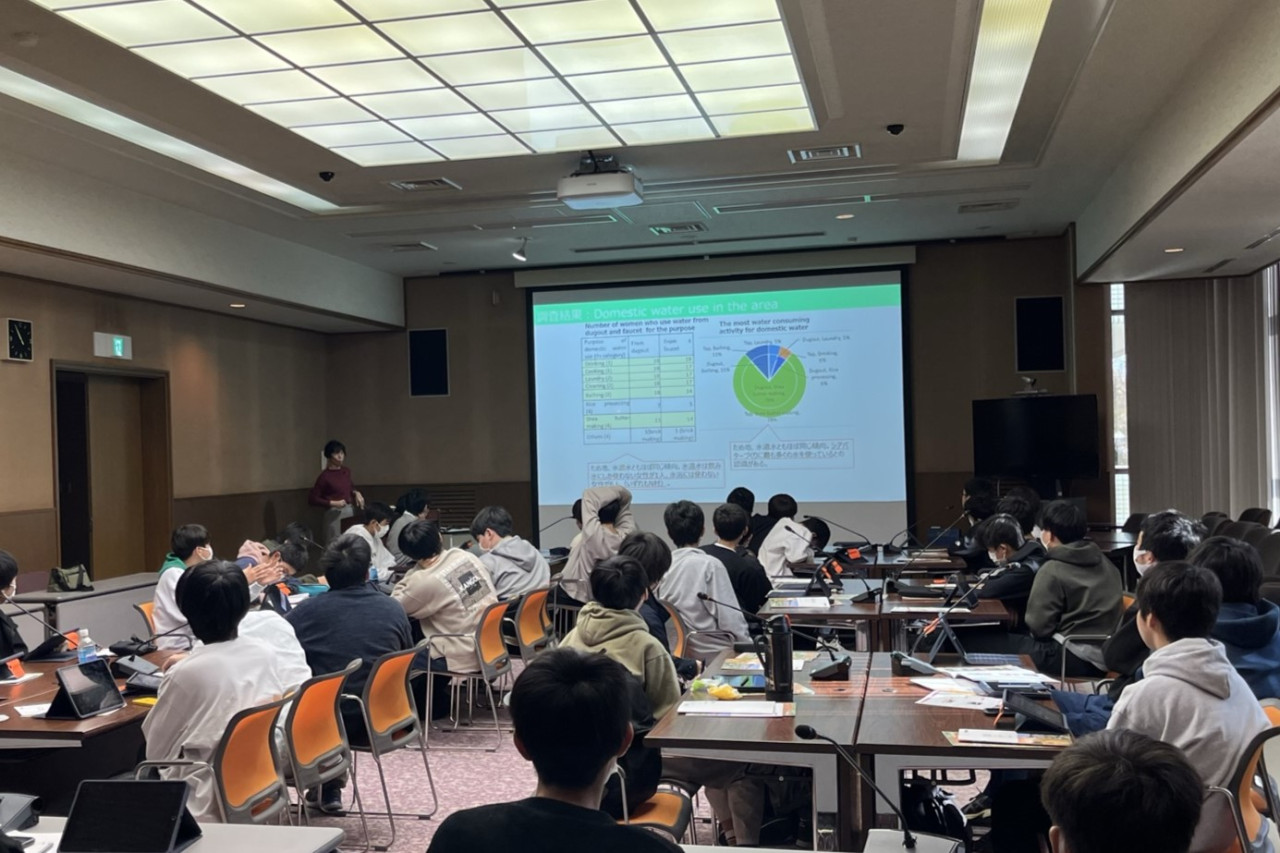In cooperation with the Tsukuba Science Tour Office, JIRCAS has been actively responding to visit requests from junior high and high schools within and outside Ibaraki Prefecture. In November, 207 students arrived from high schools in Gunma, Okinawa, Tochigi, Fukushima, and Saitama prefectures.
The primary objective of each high school visit was to stimulate students' interest in science and encourage them to explore global issues, thereby helping them to make informed decisions about their future careers.
The teachers leading the visits were tasked with learning as much as possible about the students' individual interests. They then introduced engaging topics that matched the students' preferences, such as JIRCAS' initiatives to address environmental and food challenges in developing regions. Below is a list of JIRCAS researchers who actively engaged with the visiting students and the diverse topics they presented.
November 2 (Thu): Gunma Prefectural Kiryu High School (38 1st grade students in the Science and Mathematics Course, 2 teachers)
Dr. NISHIGAKI Tomohiro (Researcher, Crop, Livestock and Environment Division)
Focusing on "Soil and agriculture in Africa," the presentation explored the global and African distribution of soils, highlighting key soil characteristics. Using vivid photos and illustrations, the presentation highlighted the limited agricultural suitability of certain African environments. Dr. Nishigaki shared insights from his ongoing research in Madagascar, showing captivating images of African flora and fauna encountered during his fieldwork. The session also included a soil quiz and hands-on soil samples, highlighting the often overlooked importance of soil as a fundamental cornerstone of our food production processes.
November 7 (Tue): Okinawa Prefectural Kyuyo High School (40 2nd grade students in the Science and Mathematics Course, 2 teachers)
Dr. NAMBU Ryogen (Senior Researcher, Fisheries Division)
The research was presented under the title "Let's think about fishery resource management, aquaculture and the environment". In the lecture, Dr. Nambu introduced the possibility of sustainable use of fishery resources through efforts to increase the number of clams and sea cucumbers, which are the subject of his research, with the use of videos.
November 9 (Thu): Tochigi Prefectural Tochigi High School (40 students per grade, 2 teachers) *4th visit in a row
Dr. IZUMI Taro (Project Leader, Rural Development Division) *Indoor lecture
Dr. SASAKI Kazuhiro (Senior Researcher, Biological Resources and Post-harvest Division) *Outdoor lecture
The students were divided into two groups for an introduction to JIRCAS research (indoor lecture) and an introduction to rice samples at the Hachimandai Experimental Field (outdoor lecture). In the indoor lecture, Dr. Izumi introduced the rice water management technology that leads to the reduction of greenhouse gas emissions and its social implementation, using a case study of the Mekong Delta in Vietnam, where JIRCAS is working on a comprehensive climate change project. Meanwhile, at the Hachimandai Experimental Field, students observed rice cultivation in the tropics and in Japan, and were introduced to agricultural machinery.
November 15 (Wed): Fukushima Prefectural Soma Agricultural High School (39 1st grade students in the Food Science Course, 2 teachers)
Dr. MARUI Jun-ichiro (Senior Researcher, Biological Resources and Post-harvest Division)
Under the theme of "Research on tasty and useful fermented foods," the seminar introduced Thai fermented rice noodles (khanom jeen) and Lao fish sauce (padaek). Padaek was actually prepared at the venue, and students were able to experience the smell of Lao fish sauce.
November 24 (Fri): Saitama Prefectural Kumagaya High School (40 students per grade, 2 teachers) *5th visit
Dr. OKA Naoko (Senior Researcher, Rural Development Division)
Under the theme "Rural Development Research in Developing Countries," the lecture introduced agricultural water management technologies and their relationship to the SDGs, with research examples from Sri Lanka and Ghana. In addition, a group discussion was held on how to provide support to developing regions. Many participants expressed the need to provide food aid to countries suffering from hunger, as well as support for building peaceful societies.

